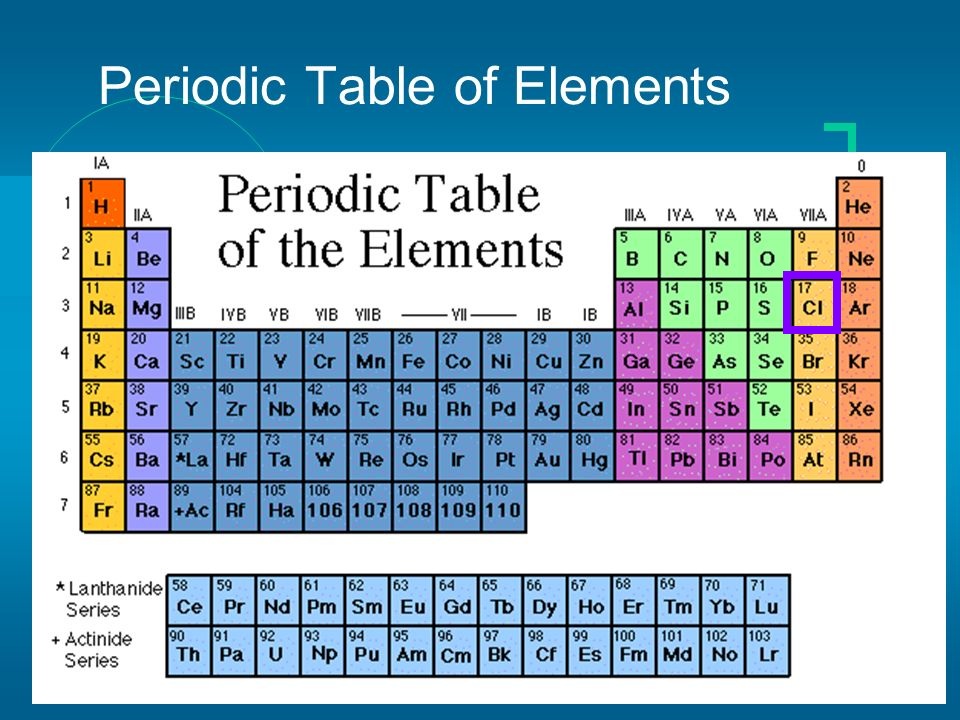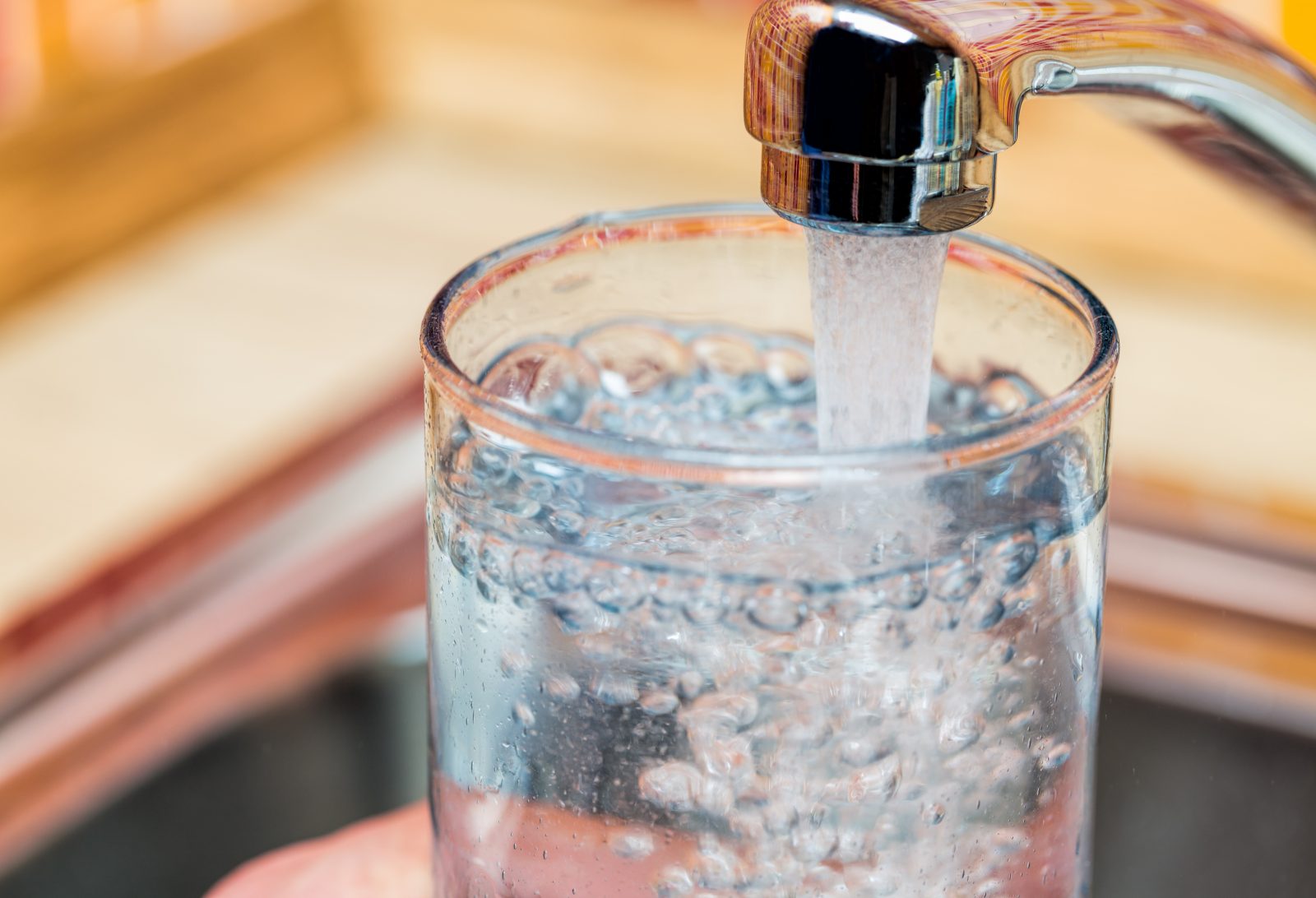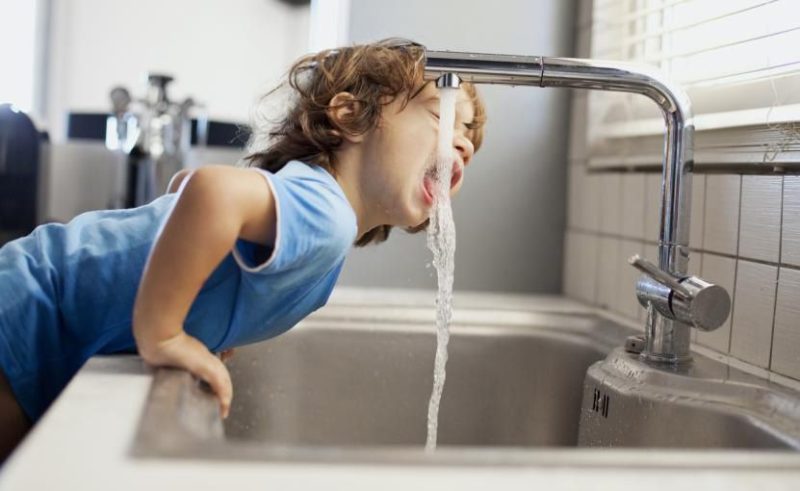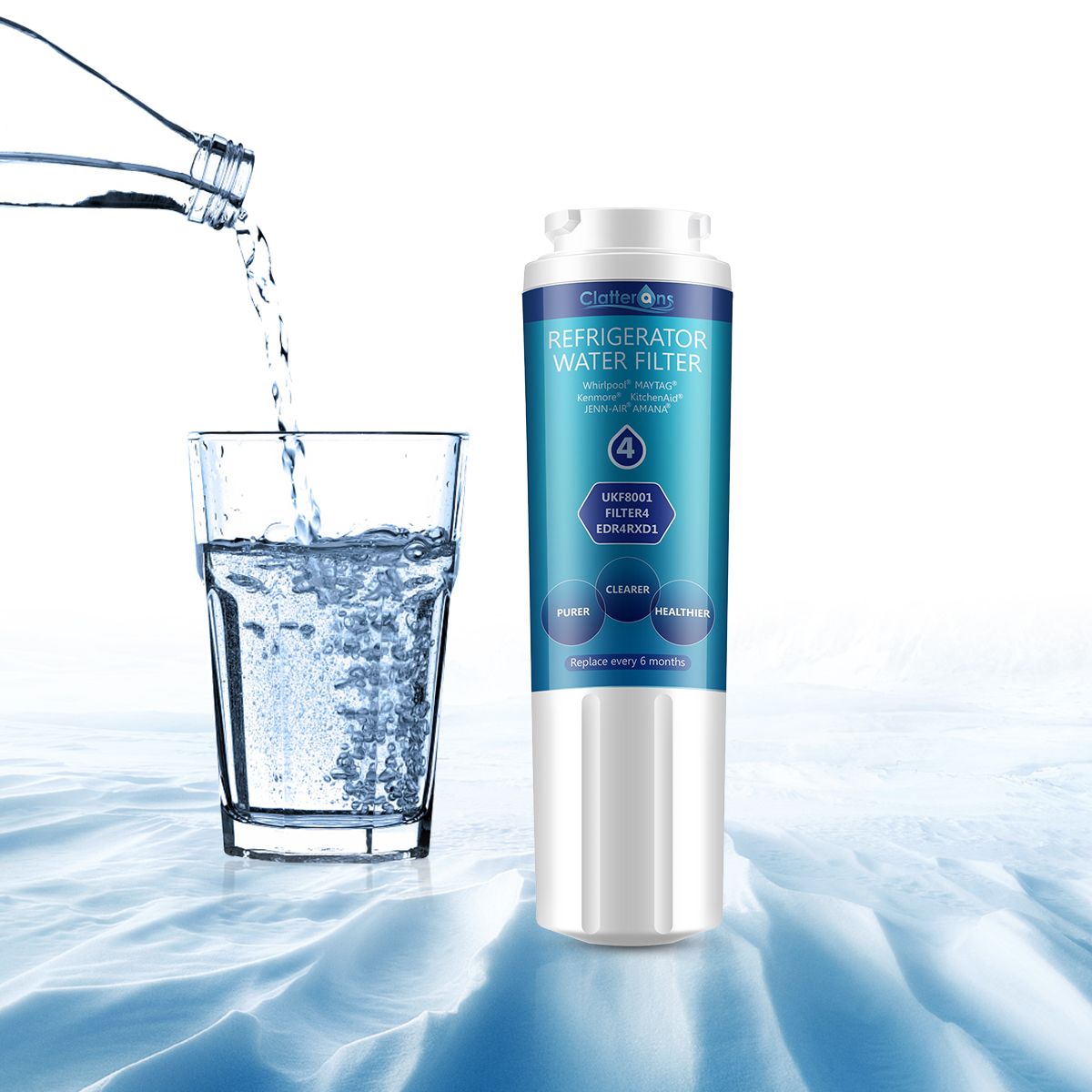Millions of people drink chlorinated tap water every day. Chlorine is a disinfectant introduced to drinking water to reduce or remove microorganisms, such as viruses and bacteria in the water supplies. Yet the addition of chlorine to our drinking water can cause a number of health problems. Luckily, chlorine is fairly easy to eliminate from drinking water with the help of carbon-based refrigerator water filters.
What is Chlorine and Why it is Added to Water?
Chlorine, element No.17 on the Periodic Table of Elements, has gas, liquid and solid forms. Chlorine gas is two and one-half times as heavy as air, has an intensely disagreeable suffocating odor, as well as is exceedingly poisonous. In its liquid and solid form, chlorine is a powerful oxidizing, bleaching and disinfecting agent. Chlorine has multiple applications. It is an important chemical in water purification to kill bacteria and other microbes from drinking water supplies. Also, it is applied widely in the manufacture of many products and items directly and indirectly, for example, in the production of the paper product, antiseptic, dyestuffs, food, insecticides, plastics, medicines, solvents and many other consumer products.

How Does Chlorinated Drinking Water Destroy Our Health?
Chlorine is used to keep drinking water clean by disinfecting it and killing most pathogens. While there is much well-founded concern about chlorine. When chlorine is introduced into our drinking water, it combines with other organic compounds which are very often found in water to form harmful chlorination byproducts, called Trihalomethanes (THMs). THMs can cause the production of free radicals in the body to trigger cell damage. The following are the harmful effects of consuming chlorine in the drinking water for you and your family.
- Chlorine Increases the Risk of Cancer. Chlorine is a potential health hazard to both adults and children as the by-products of chlorination are associated with increased cancer risks. According to reports by research institutes, the risk of developing cancer is up to 93% higher in people who drink chlorinated water. Women with breast cancer have 50%-60% higher levels of THMs in their fat tissue than those who are without breast cancer. And the risk of bladder cancer for a person who drinks chlorinated water in a long-term time is as much as 80%.
- Chlorine Kills Beneficial Gut Bacteria. When chlorine is added to the water, it kills pathogens, but when it is put into our human body, it eliminates our beneficial gut bacteria. Research has been indicated that the healthy and flourishing gut bacteria is greatly important to our digestive system and immune system. There is a connection found by scientists between a lack of these good microbes in the digestive system and the presence of a wide range of diseases, such as obesity, colorectal cancer, irritable bowel syndrome and some autoimmune diseases, like diabetes and asthma, even autism.
- Chlorine Acts as an Estrogen Mimic. When chlorine is in our body, it becomes a xeno (or false) estrogen. Xenoestrogens contribute to estrogen dominance that can result in both male and female cancers and many other health concerns such as fatigue, hair loss, lack of libido, hypothyroidism, hypoglycemia, insomnia, and PMS. Also, it causes vitamin deficiencies like zinc, magnesium and B vitamins.
- Chlorine Results in Heart Problems and Weight Gain. Chlorine introduced to drinking water is proven by scientists to cause atherosclerosis and cardiovascular problems such as heart attacks and stroke. Besides, chlorine displaces the iodine in your thyroid, which results in hypothyroidism and unwanted side effects such as weight gain. Chlorine also kills antioxidants like vitamins A and E which normally protect your good fats from damage. In this way, you are in lack of essential fatty acids Omega-3,6, and 9, hence you gain more weight.

How to Eliminate Chlorine in Drinking Water?
If you want to remove chlorine from your drinking water, the most low-tech solution is to fill a glass water bottle with tap water, then let it sit in the refrigerator open to the air for one day. In this way, the chlorine will evaporate. Although this method can rid your water from most of the chlorine, it is inconvenient and unhygienic with other pathogens leaving behind.
The most efficient method for removing chlorine, chlorine byproducts, and favor and odor problems, is to filter with granular activated carbon or other suitable appropriate chemical-removing filter media. Then, the fridge filters emerge to ensure the tap water drinkable and healthy. Not only does it eliminate chlorine and its byproducts, it does also protect you and your family from parasites and heavy metals.
Clatterans provides various types of water filters. Designed with activated carbon technology, our refrigerator water filter replacements are compatible with different refrigerator models, such as Whirlpool refrigerator water filter, KitchenAid refrigerator water filter and PUR water filter. Certified and tested by IAPMO and NSF/ANSI Standards 42 for material safety and structural integrity requirements, the refrigerator filters are capable of removing chlorine pollutants, lead, mercury, cysts and other harmful components from the water.
For an overview of fridge water filter options, click here.
Conclusion
Chlorine plays an indispensable role in protecting the drinking water from harmful pathogenic germs, but it also does harm to our health when it is not filtered out. Whatever option you settle on, one thing is clear – an instant and affordable supply of safe and delicious water is one of the best investments you can make for the health of you and your family.







… [Trackback]
[…] There you can find 13191 additional Info to that Topic: blog.clatterans.com/how-to/effects-of-chlorine-on-human-health/ […]
… [Trackback]
[…] Find More Information here on that Topic: blog.clatterans.com/how-to/effects-of-chlorine-on-human-health/ […]
… [Trackback]
[…] Read More Information here to that Topic: blog.clatterans.com/how-to/effects-of-chlorine-on-human-health/ […]
… [Trackback]
[…] Find More on to that Topic: blog.clatterans.com/how-to/effects-of-chlorine-on-human-health/ […]
… [Trackback]
[…] Find More Info here to that Topic: blog.clatterans.com/how-to/effects-of-chlorine-on-human-health/ […]
… [Trackback]
[…] Find More on to that Topic: blog.clatterans.com/how-to/effects-of-chlorine-on-human-health/ […]
… [Trackback]
[…] Find More on that Topic: blog.clatterans.com/how-to/effects-of-chlorine-on-human-health/ […]
… [Trackback]
[…] There you can find 56089 more Information to that Topic: blog.clatterans.com/how-to/effects-of-chlorine-on-human-health/ […]
… [Trackback]
[…] Here you will find 32337 more Information to that Topic: blog.clatterans.com/how-to/effects-of-chlorine-on-human-health/ […]
… [Trackback]
[…] Read More Info here on that Topic: blog.clatterans.com/how-to/effects-of-chlorine-on-human-health/ […]
… [Trackback]
[…] There you can find 50880 more Information to that Topic: blog.clatterans.com/how-to/effects-of-chlorine-on-human-health/ […]
… [Trackback]
[…] Here you will find 9966 more Information to that Topic: blog.clatterans.com/how-to/effects-of-chlorine-on-human-health/ […]
… [Trackback]
[…] Find More to that Topic: blog.clatterans.com/how-to/effects-of-chlorine-on-human-health/ […]
… [Trackback]
[…] Here you will find 45909 additional Info to that Topic: blog.clatterans.com/how-to/effects-of-chlorine-on-human-health/ […]
… [Trackback]
[…] There you will find 11000 more Info on that Topic: blog.clatterans.com/how-to/effects-of-chlorine-on-human-health/ […]
… [Trackback]
[…] Find More on that Topic: blog.clatterans.com/how-to/effects-of-chlorine-on-human-health/ […]
… [Trackback]
[…] Info to that Topic: blog.clatterans.com/how-to/effects-of-chlorine-on-human-health/ […]
… [Trackback]
[…] Read More on on that Topic: blog.clatterans.com/how-to/effects-of-chlorine-on-human-health/ […]
… [Trackback]
[…] Info to that Topic: blog.clatterans.com/how-to/effects-of-chlorine-on-human-health/ […]
… [Trackback]
[…] There you can find 74741 more Information to that Topic: blog.clatterans.com/how-to/effects-of-chlorine-on-human-health/ […]
… [Trackback]
[…] There you can find 37647 additional Information on that Topic: blog.clatterans.com/how-to/effects-of-chlorine-on-human-health/ […]
… [Trackback]
[…] Find More on on that Topic: blog.clatterans.com/how-to/effects-of-chlorine-on-human-health/ […]
… [Trackback]
[…] Here you will find 17812 more Info on that Topic: blog.clatterans.com/how-to/effects-of-chlorine-on-human-health/ […]
… [Trackback]
[…] Find More on to that Topic: blog.clatterans.com/how-to/effects-of-chlorine-on-human-health/ […]
… [Trackback]
[…] Find More here on that Topic: blog.clatterans.com/how-to/effects-of-chlorine-on-human-health/ […]
… [Trackback]
[…] Find More on to that Topic: blog.clatterans.com/how-to/effects-of-chlorine-on-human-health/ […]
… [Trackback]
[…] Find More Information here to that Topic: blog.clatterans.com/how-to/effects-of-chlorine-on-human-health/ […]
… [Trackback]
[…] Read More Info here on that Topic: blog.clatterans.com/how-to/effects-of-chlorine-on-human-health/ […]
… [Trackback]
[…] There you can find 2173 more Info to that Topic: blog.clatterans.com/how-to/effects-of-chlorine-on-human-health/ […]
… [Trackback]
[…] Information on that Topic: blog.clatterans.com/how-to/effects-of-chlorine-on-human-health/ […]
… [Trackback]
[…] Find More Info here to that Topic: blog.clatterans.com/how-to/effects-of-chlorine-on-human-health/ […]